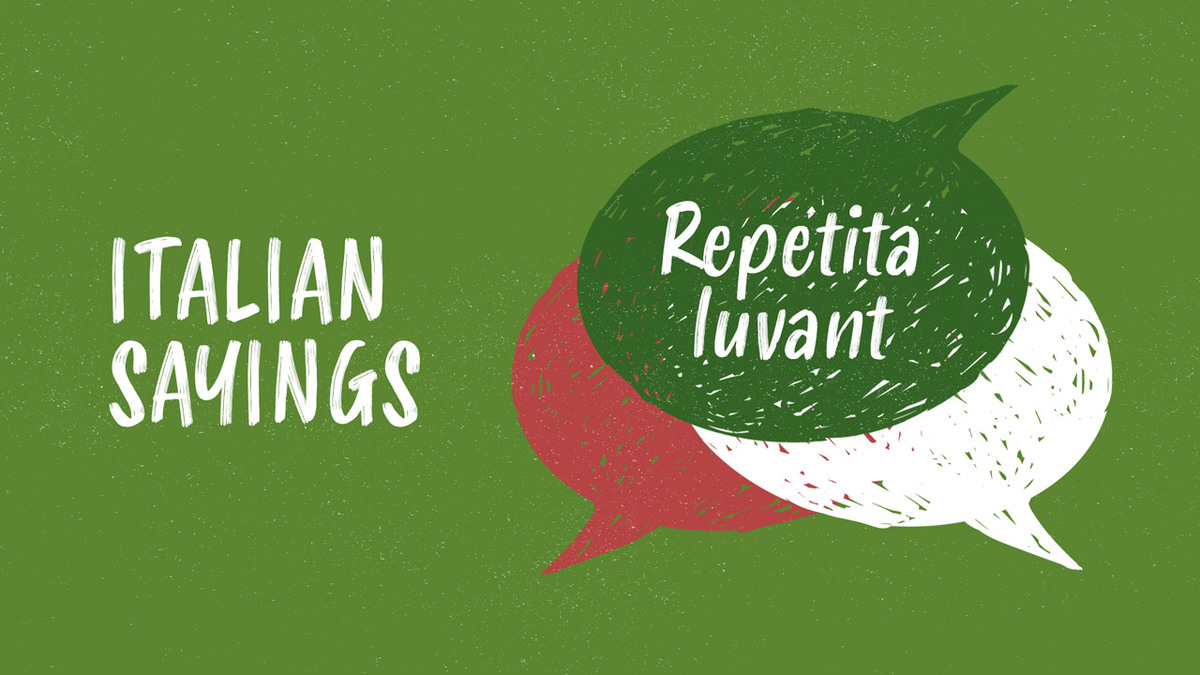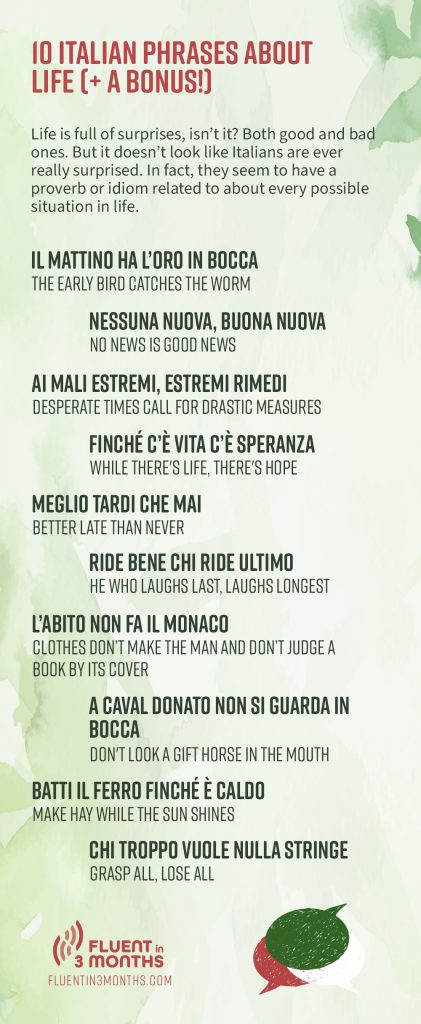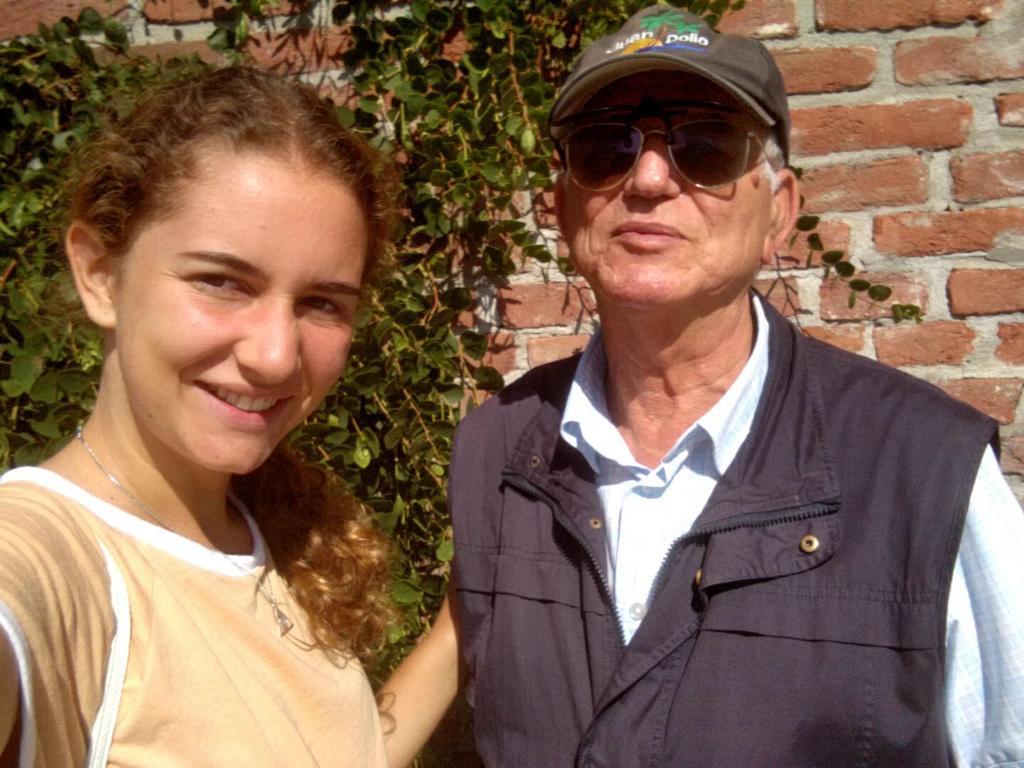38 Italian Sayings that Italians Really Use
Every language has its own turns of phrase and quirky sayings, and we Italians are fond of our many aforismi e proverbi (“aphorisms and proverbs”).
Think about it: what better way is there to sound like a native than to incorporate local expressions into your speech?
Plus, by learning Italian sayings you’ll get an insight into Italian culture and how Italians think.
In this article, you’ll find popular Italian sayings about life, success, friendship, family, and food, as well as some Latin expressions that are still widely used in Italy, as well as a list of Italian idioms.
You can also watch me share about 7 of my favourite Italian sayings in this video:
Table of contents
- 10 Italian Phrases About Life (+ a Bonus!)
- 1. Il Mattino Ha l’Oro in Bocca – “The Early Bird Catches the Worm”
- 2. Nessuna Nuova, Buona Nuova – “No News Is Good News”
- 3. Ai Mali Estremi, Estremi Rimedi – “Desperate Times Call for Drastic Measures”
- 4. Finché C’È Vita C’È Speranza – “While There’s Life, There’s Hope”
- 5. Meglio Tardi Che Mai – “Better Late Than Never”
- 6. Ride Bene Chi Ride Ultimo – “He Who Laughs Last, Laughs Longest”
- 7. L’Abito Non Fa il Monaco – “Clothes Don’t Make the Man” and “Don’t Judge a Book by Its Cover”
- 8. A Caval Donato Non si Guarda in Bocca – “Don’t Look a Gift Horse in the Mouth”
- 9. Batti il Ferro Finché È Caldo – “Make Hay While the Sun Shines”
- 10. Chi Troppo Vuole Nulla Stringe – “Grasp All, Lose All”
- 11. Bonus Italian Saying: La Vita È Come Una Fotografia. Se Sorridi, Viene Meglio (“Life is Like a Photograph. If You Smile, It’s Better”)
- 5 Italian Phrases About Success
- 12. Chi Dorme Non Piglia Pesci – “You Snooze, You Lose”
- 13. Chi Fa Da Sé, Fa Per Tre – “Do It Yourself If You Want It Done Right”
- 14. Chi Non Fa, Non Falla – “He Who Makes No Mistakes, Makes Nothing”
- 15. La Pazienza È la Virtù dei Forti – “Patience is a Virtue”
- 16. Non Rimandare a Domani Quello Che Puoi Fare Oggi – “There’s No Time Like the Present”
- 4 Italian Sayings About Friends and Family
- 17. Chi Trova un Amico, Trova un Tesoro – “He Who Finds a Friend, Finds a Treasure”
- 18. Noi Non Potremo Avere Perfetta Vita Senza Amici – “We Couldn’t Have a Perfect Life Without Friends”
- 19. Quale il Padre, Tale il Figlio – “Like Father, Like Son”
- 20. Tra Moglie e Marito Non Mettere il Dito – “Never Interfere Between a Husband and Wife”
- 4 Italian Sayings About Food
- 4 Italian Sayings About Love
- 5 Latin Sayings Used by Italians
- 5 Italian Idioms
- What’s Your Favorite Italian Saying?
Italian is my native language, so I’m very proud to share these.
Pronti? Via! (“Ready? Let’s go!”)
10 Italian Phrases About Life (+ a Bonus!)
Life is full of surprises, isn’t it? Both good and bad ones. But it doesn’t look like Italians are ever really surprised. In fact, they seem to have a proverb or idiom related to about every possible situation in life.
As there are many Italian sayings about life, I’ve collected 10 of the most popular ones for you. As a bonus, I’ve also added a saying that isn’t very popular but makes up for it in charm.
1. Il Mattino Ha l’Oro in Bocca – “The Early Bird Catches the Worm”
If you’re an early riser, this Italian quote might be your motto.
Literally translated as “the morning has gold in its mouth”, il mattino ha l’oro in bocca suggests that the early morning hours are the ones which bring about more productivity.
This phrase is considered to be the equivalent of the English “the early bird catches the worm” because, despite not meaning the exact same thing, they have a similar message: those who start off before others catch the best opportunities.
2. Nessuna Nuova, Buona Nuova – “No News Is Good News”
There is little to explain about nessuna nuova, buona nuova as it has an exact equivalent in English: “no news is good news.” You will also hear it as nulla nova, bona nova, the original Latin version of the saying.
If you’re not familiar with the phrase in any of those languages, you’ll catch its meaning after reading its Italian counterpart: le notizie brutte si sanno subito. (“bad news is immediately known”)
Not hearing any news about a person usually means that their routine is going on as always, hence there is no need to report any changes.
3. Ai Mali Estremi, Estremi Rimedi – “Desperate Times Call for Drastic Measures”
This Italian phrase comes from the Latin extremis malis, extrema remedia. It literally translates to “to extreme wrongs, extreme cures”, but would usually be rendered in English as “desperate times call for drastic measures”.
This phrase is used when talking about serious situations. If a problem is harsh, the proverb suggests that the solution should be equally heavy.
4. Finché C’È Vita C’È Speranza – “While There’s Life, There’s Hope”
Italians are fond of this phrase. They like to remember that they should keep hoping for the best, even when they are in a dire situation or things look impossible.
Finché c’è vita, c’è speranza has a sibling proverb: la speranza è l’ultima a morire (literally: “hope is the last one to die”).
5. Meglio Tardi Che Mai – “Better Late Than Never”
Meglio tardi che mai is another Italian phrase that points to a glass-half-full mindset. It is a reminder that it’s better when things happen late, but still happen, rather than not happening at all.
This proverb has a twin related to quantities: meglio poco che niente (“something’s better than nothing”).
Both phrases are often used sarcastically.
6. Ride Bene Chi Ride Ultimo – “He Who Laughs Last, Laughs Longest”
Because of this saying, I’ve always been cautious during competitions. You should never feel like the victory is yours before the competition is actually over!
Ride bene chi ride ultimo is not only used as a warning but also as a moral. Its meaning sometimes coincides with that of the sayings non vendere la pelle dell’orso prima di averlo ucciso (literally: “don’t sell the bear’s skin before having killed it”) or non dire gatto se non ce l’hai nel sacco (literally: “don’t say cat if you don’t have it in the bag”), which both mean “don’t count your chickens before they’re hatched”.
7. L’Abito Non Fa il Monaco – “Clothes Don’t Make the Man” and “Don’t Judge a Book by Its Cover”
Literally translated in English l’abito non fa il monaco becomes “the clothes do not make the monk”. We can see in it a trace of the heavy importance of the Catholic religion in Italian culture.
If we were to look for the English equivalent of this idiom, we’d find two. Let’s see why.
Firstly, it’s not the monk’s clothes that make him a holy man, but his actions. In this case, the phrase means “clothes don’t make the man”.
But then, if a man is clothed as a monk, he isn’t necessarily one. In this case, the English translation would be “don’t judge a book by its cover”. There even is another saying for this in Italian: “non è tutt’oro ciò che luccica” (“all that glitters is not gold”).
8. A Caval Donato Non si Guarda in Bocca – “Don’t Look a Gift Horse in the Mouth”
You’d be surprised at how often this saying is used in Italy. How weird is it to talk about looking a horse in the mouth?
When horses were a crucial resource, buyers checked a horse’s mouth before purchasing them to make sure it was in good health. They assured themselves that the horse was worth the money spent and would be able to perform its tasks well. That’s what we still do when we’re considering buying a product, after all.
But would you check the quality of a gift you’ve received in front of the person who gifted it to you? That’d be rude.
That’s what this saying means. You should be grateful for what you get and not look for reasons to dismiss a gift.
9. Batti il Ferro Finché È Caldo – “Make Hay While the Sun Shines”
Batti il ferro finché è caldo (literally: “beat the iron while it’s hot”) is the Italian phrase used when you want to encourage someone to act while there is an opportunity to grab. In fact, giving iron shape is possible only when it’s hot enough to be reformed. When it cools down, there’s nothing you can do to bend it.
10. Chi Troppo Vuole Nulla Stringe – “Grasp All, Lose All”
Chi troppo vuole nulla stringe literally means “those who want too much end up keeping/getting nothing”.
It’s a colloquial but wise saying that brings to mind one of Aesop’s fables: Il Cane e l’Osso (“The Dog and The Bone”).
In this story, a dog is enjoying a bone on the side of a river. While he is chewing his meal, he happens to look down at the water’s surface. He mistakes his reflection for another dog chewing on what seems to him like a bigger bone. Eager to get a better meal, the dog opens his mouth to get the other bone… But what happens instead is that his own meal falls into the river, where the dog can’t get it back.
There’s another Italian phrase with a similar meaning. It is: il meglio è il nemico del bene (“the perfect is the enemy of good.”) While there’s nothing wrong in aiming to give your best effort, the proverb teaches that wanting too much perfection might lead you to lose the work you put up to get something simply good.
11. Bonus Italian Saying: La Vita È Come Una Fotografia. Se Sorridi, Viene Meglio (“Life is Like a Photograph. If You Smile, It’s Better”)
This one is not very popular as it is more recent than any of the above-mentioned phrases, but I wanted to include it because it’s one of the most beautiful Italian sayings I’ve ever heard.
5 Italian Phrases About Success
There are quite a few Italian expressions related to success. Here are five that are frequently used in Italy:
12. Chi Dorme Non Piglia Pesci – “You Snooze, You Lose”
Chi dorme non piglia pesci literally translates to “those who sleep don’t catch fish.”
Does it sound like it makes no sense? Well, think about it. You can’t expect to catch fish if all you do when going out to the river is sleep on the bank.
Similarly, you can’t expect to get results if you’re too lazy to work for them.
13. Chi Fa Da Sé, Fa Per Tre – “Do It Yourself If You Want It Done Right”
According to this saying, doing things yourself is as if you did the job of three people. What Italians want to say is that you have to do things yourself if you want them to be done properly. And here I am writing this excellent article about Italian sayings, so of course, I think it’s true. 😄
14. Chi Non Fa, Non Falla – “He Who Makes No Mistakes, Makes Nothing”
The exact English translation of chi non fa, non falla is “who does nothing makes no mistakes”.
It doesn’t sound like much of a proverb, does it? Making no mistakes could even be considered something positive. But the saying makes sense when you know that there is an implicit conclusion to it.
In fact, Italian parents never tire of reminding their children that mistakes pave the path to great achievements. Who hasn’t been told that making mistakes is a way to learn new lessons?
So by saying “who does nothing makes no mistakes,” the proverb means that those who do nothing achieve and learn nothing.
15. La Pazienza È la Virtù dei Forti – “Patience is a Virtue”
In Italian, we say that “patience is the virtue of the strong”. Anyone can give in to anger or get impatient, but few are strong enough to keep calm and wait for life to happen at its own pace.
Being able to never lose my temper is a superpower I’d love to have.
16. Non Rimandare a Domani Quello Che Puoi Fare Oggi – “There’s No Time Like the Present”
Raise your hand if you’ve put off something you needed to do only to find that you ran out of time. 🙋
This Italian saying is a wise warning to avoid that kind of situation. Non rimandare a domani quello che puoi fare oggi literally means “don’t postpone what you could do today to tomorrow.”
4 Italian Sayings About Friends and Family
Family and friends hold an important place in Italian culture. For this reason, there are a few Italian proverbs related to friends and family.
Let’s discover four of them.
17. Chi Trova un Amico, Trova un Tesoro – “He Who Finds a Friend, Finds a Treasure”
One of my middle-grade teachers once taught me that a true friend is someone who would not hesitate in letting you stay at their place if your house burnt down. It’s an extreme example, but it covers what true friendship should convey.
In this Italian saying, finding a friend is compared to finding a treasure because a true friend turns out to be an invaluable companion in life.
18. Noi Non Potremo Avere Perfetta Vita Senza Amici – “We Couldn’t Have a Perfect Life Without Friends”
This quote by Dante Alighieri is one of the most famous Italian sayings still used in everyday speech despite its old-fashioned phrasing. You might hear it from Italians who have studied classic literature at university.
By reading this quote and the saying above, you can understand how valuable friendship is in Italy.
19. Quale il Padre, Tale il Figlio – “Like Father, Like Son”
Also quoted as tale padre, tale figlio, this saying is often used with a negative connotation.
It implies that a son has the same values, morals, or behavioral tendencies as his father and usually serves as a criticism or reproval of said traits.
20. Tra Moglie e Marito Non Mettere il Dito – “Never Interfere Between a Husband and Wife”
Tra moglie e marito non mettere il dito is literally translated as “don’t put a finger between wife and husband.” Granted, it doesn’t stand out for clarity, but at least it rhymes in Italian.
I’ve learnt this phrase from my Italian grandparents. Getting involved in a couple’s business when they are arguing is not a good thing if you do not know the depth of the situation.
4 Italian Sayings About Food
You might have scrolled down or skimmed the previous parts to get to this one. I don’t blame you if you did, few people can resist the words “Italian” and “food” in the same sentence.
Italians do very well when they deal with food in the kitchen, but what about when they mix it up with proverbs and sayings? I’ll let you judge.
21. L’Appetito Vien Mangiando – “Appetite Comes With Eating”
If you’re planning to go to Italy and are thinking about learning only one saying, this is the one. It’s not particularly meaningful, but it’s used very often.
To be honest, the truth behind the saying is not so much about appetite as it is about gluttony, but I guess it sounded better this way. It means that people always want more than they already have.
And with Italian cuisine, you bet they do. 😉
22. Non Tutte le Ciambelle Riescono Col Buco – “Not Everything Turns Out as Planned”
Non tutte le ciambelle riescono col buco literally means “not all doughnuts come out with a hole.” If this saying makes you feel perplexed, don’t worry, you’re not alone: even some Italians are not too keen on it!
First of all, why would Italians talk about doughnuts as they’re not a typical Italian food? That’s a good question, and the answer might disappoint you in its simplicity. In fact, there isn’t a real answer. Italians just seem to have warmed up to doughnuts and decided that they are the perfect ingredient to cook up a proverb.
Secondly, what does the saying mean? This I know. A doughnut is supposed to look like a ring of dough, but sometimes an error in the preparation might result in a hole-less doughnut. Not everything in life turns out the way you planned!
23. Tutto Fumo e Niente Arrosto – “All Bark and No Bite”
Do you know people who like to rant a lot, but when it comes to taking action, they suddenly become very shy? You could say about them that they are tutto fumo e niente arrosto.
You can also use the expression to describe hyper-hyped products or initiatives that turn out to be a lot less than what they’d been marketed as.
24. Cercare il Pelo nell’Uovo – “To Be Nit-Picky”
Cercare il pelo nell’uovo literally translated to English would be “to look for the hair in the egg”. It means to split hairs, looking for the fault or minor error in a situation.
4 Italian Sayings About Love
If you think about it, love is an impossible concept to define in all its beauty. However, Italians try their best to put it into words. They have many ways to talk about romantic love with their partners, for example.
Here, you can learn four Italian sayings about love.
25. L’amore È Cieco – “Love Is Blind”
This saying could have several interpretations. Whether it relates to blindness when it comes to physical appearance or a love interest’s faults, the message is clear: when you fall in love, you do it regardless of anything.
26. Al Cuore Non Si Comanda – “The Heart Wants What It Wants”
Al cuore non si comanda (literally: “you can’t rule the heart”) means that love blooms unexpectedly and you can’t control it.
I’ve heard from trusted sources that it’s a favorite motto of rom-com scriptwriters.
27. Sfortunato al Gioco, Fortunato in Amore – “Unlucky at Cards but Lucky in Love”
To be honest, this proverb does not have a tried-and-true message to deliver. It’s more of a superstitious belief than a moral.
I, for example, am very unlucky at both. 💔
28. Occhio Non Vede, Cuore Non Duole – “Out of Sight, Out of Mind”
The literal translation of occhio non vede, cuore non duole is “eye doesn’t see, heart doesn’t hurt.”
What this saying implies is that what you don’t see with your own eyes won’t hurt you. It’s used when talking about love delusions.
5 Latin Sayings Used by Italians
In Italy, the study of ancient Latin and Greek is well-looked upon as the civilizations they’re linked to are an important foundation of Italian culture.
Besides small words or expressions like viceversa (“the other way around”), idem (“same”), and in extremis (“at the last moment”), Italians have conserved several Latin expressions for day-to-day use. Here are five of them.
As you’ll notice, they’re short, which makes them easier to remember and use on a daily basis.
29. Repetita luvant – “Repeating Does Good”
In Italian, repetita Iuvant becomes ripetere la stessa cosa, aiuta (“repeating the same thing helps”), but the Latin version is used the most.
It’s used in situations when repetition could be considered boring, such as in school, to remind the listener that repeating things makes them easier to remember.
I learnt this one from my nonno (“grandfather”), who used to tell me repetita iuvant when I got bored with my school work.
30. Verba Volant, Scripta Manent – “Words Fly Away, Writings Remain”
Verba volant, scripta manent, or le parole volano, gli scritti rimangono in Italian, is a quote from a famous speech by the Emperor Titus at the Roman senate.
It’s a truth that spoken words can be forgotten or ignored, but written words remain tangible and visible proof.
31. Ad Maiora Semper – “Towards Greater Things”
Ad maiora semper means verso cose più grandi (“towards greater things”). It’s a phrase for encouraging people when their life is opening up to new possibilities, such as after graduation.
32. De Gustibus (Non Disputandum Est) – “There Is No Arguing About Taste”
This phrase, which in Italian becomes i gusti non si discutono, is used to say that there is no arguing about taste as it is subjective.
Some of my friends use it when I tell them their love for pineapple pizza is irrational.
33. Carpe Diem – “Seize the Day”
The Italian version of carpe diem is cogli l’attimo (“seize the moment”). This Latin phrase is popular worldwide as a reminder to enjoy the present.
5 Italian Idioms
You’ve learnt many Italian proverbs and sayings as well as some Latin ones… Now how about getting to know some Italian idioms? Let’s do that.
34. In Bocca Al Lupo! – “Good Luck!”
Yes, you’ve read this right. A common colloquial way to wish someone good luck in Italian is to tell them “in the mouth of the wolf.”
This idiom’s origin is unclear, but a popular belief is that it comes from the legend of Romulus and Remus, the founders of Rome. The twins were found and raised by a wolf from a young age, and because of this, the wolf represents protection and care.
However, this poetic version clashes with the typical answer to the interjection: crepi il lupo (“may the wolf die”). This may stem from the times when wolves were considered the most dangerous animals in Italy.
35. Cavolo! – “Darn!”
Imagine this situation: you’re at the till at the supermarket and the cashier has finished scanning your week’s worth of groceries. You’re about to take out your wallet to pay when… Cavolo! (literally, “Cabbage!”) You realize you’ve left it at home.
36. Un Freddo Cane – “It’s Freezing Cold”
Brrr… If you want to shiver in Italian, you must use this funny idiom: fa un freddo cane. It’s hard to translate it to English in a way that makes sense.
Cane (“dog”) in this case is used as an intensifying adjective, so the phrase doesn’t mean “it’s dog cold” but “it’s really, really cold”.
37. Sogni d’Oro – “Sweet Dreams”
To wish your loved one a good night in Italian, you can tell them to have sogni d’oro (literally: “golden dreams”).
38. Farsi in Quattro – “Bend Over Backwards”
Farsi in quattro (literally, “Make oneself in four”) is the Italian way to say that you’ve gone out of your way to do something. It’s an idiom often used to describe parents’ efforts to give the best to their children.
What’s Your Favorite Italian Saying?
So, what do you think of these Italian sayings? I live in London now, so I don’t get to use them very often, and it felt so good to share them with you!
Now, it’s your turn to use them! In bocca al lupo! (“Good luck!”)






Social